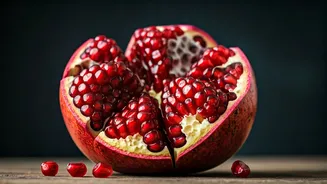Poor Preparation Techniques
One of the most frequent errors is the way people prepare pomegranates. Many struggle with extracting the seeds without making a mess or damaging the arils
(the juicy seed coverings). Incorrect techniques often involve forceful methods that can crush the seeds, releasing bitter tannins and juice that stains everything. The right method involves scoring the pomegranate's crown, then gently splitting it open. Submerging the sections in water and gently loosening the seeds makes them sink to the bottom, separating from the white membrane. This approach not only keeps your kitchen clean but also preserves the delicate flavor of the seeds.
Ignoring Seed Quality
The quality of the seeds themselves is another crucial aspect often overlooked. Pomegranates should have plump, ruby-red seeds that are bursting with juice. Avoid fruits with seeds that look shriveled, pale, or have a brownish hue, as these indicate they may be old, dried out, or not fully ripe. Fresh pomegranates provide a superior taste and deliver maximum nutritional value, whereas older or poorly stored pomegranates offer a less enjoyable experience. Always select pomegranates that feel heavy for their size; this is a sign of juicy, well-developed seeds. Choosing the right pomegranate is the first step in unlocking its true potential.
Not Eating Seeds
Some people discard the seeds completely, swallowing only the juice. However, the seeds are packed with nutrients, including fiber, which is vital for digestive health. Chewing the seeds provides a satisfying texture and helps release the full flavor profile of the fruit. Fiber helps regulate blood sugar levels, promotes healthy cholesterol levels, and helps prevent constipation. By chewing and consuming the seeds, you are maximizing the health benefits of the pomegranate and getting the most out of each serving. Incorporating the seeds into your diet guarantees that you are experiencing the full spectrum of the pomegranate's goodness.
Eating Too Much
While pomegranates are very healthy, it's possible to overdo it. Consuming an excessive amount of pomegranates can lead to digestive discomfort. Because they are rich in fiber, eating too many seeds at once can cause bloating, gas, and stomach cramps, especially if your body is not accustomed to a high-fiber intake. To avoid this, introduce pomegranates gradually into your diet and pay attention to how your body responds. Eating in moderation allows you to enjoy the fruit without experiencing these unwanted side effects. Portion control helps you make the most of the fruit's nutritional value without any negative consequences.
Ignoring Seed Storage
Improper storage can significantly impact the quality and shelf life of pomegranates. Whole pomegranates should be stored in a cool, dry place. Once the fruit is cut open and the seeds are removed, they should be stored in an airtight container in the refrigerator to maintain freshness. Correct storage helps to prevent the seeds from drying out, losing their flavor, or developing a mealy texture. Seeds properly stored in the refrigerator can last for several days, giving you the opportunity to enjoy them over time. Following these simple storage guidelines makes certain that you always have access to fresh, tasty pomegranate seeds.
Not Knowing Recipes
Many people limit their pomegranate consumption to eating the seeds by themselves. Exploring diverse recipes can enhance your appreciation for this versatile fruit. Pomegranate seeds can be incorporated into a wide range of dishes, adding color, flavor, and nutritional value. They complement salads, yogurt, and breakfast cereals, lending a burst of freshness. Pomegranate juice can be used in smoothies, marinades, or sauces. Knowing and trying different recipes enables you to benefit from the fruit's taste and nutritional benefits while keeping your meals exciting. Experimenting with different ways to use pomegranates in cooking expands your culinary horizons.
Ignoring Potential Interactions
While pomegranates are generally safe, it's essential to be aware of possible interactions, particularly with certain medications. Some compounds in pomegranates can affect the effectiveness of specific drugs, such as blood thinners or blood pressure medications. If you are taking any medications, consult your doctor before significantly increasing your pomegranate intake. Understanding potential interactions helps you safely enjoy the fruit without compromising your health. Always prioritize your safety and well-being by staying informed about how the foods you eat might impact your medication regimen.














